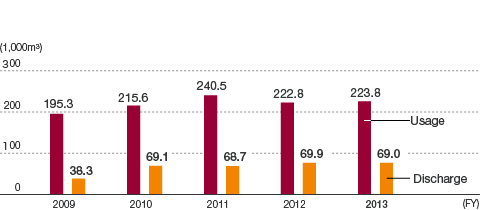 網站內容顯示
網站內容顯示

Basic policy
The Advantest Group pursues operations encompassing the "Three Rs" (reduce, reuse, and recycle) with the aim of realizing a recycling-oriented society.
In addition, the Group is building up its parts separation initiatives initially launched in fiscal 2009, pursuing efforts to recover valuable materials from waste in a manner that fully complies with all relevant laws and regulations, and conducting proper management and disposal of waste generated in the course of business operations.
Waste output and recycling rate
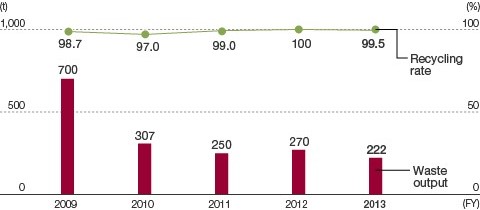
Eco-friendly recycling in employee cafeteria
We recycle the leftover food generated by the Advantest Gunma R&D Center's employee cafeteria. The leftovers are processed into compost. Some of the compost is then used to fertilize an onsite vegetable garden, and some is distributed to employees at no cost. Produce from the garden is used in meal preparation at the cafeteria. Also, used cooking oil goes to a recycling business, where it is processed into biodiesel fuel for reuse.
Eco-friendly recycling
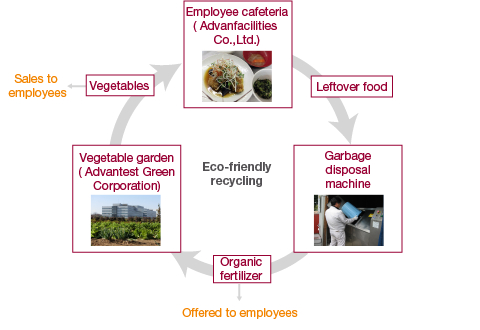
Memorandum of Understanding (MOUs) entered into with waste disposal service providers stipulating exclusion of anti-social forces
Companies have been imposing written obligations stipulating that contractual relationships may be terminated if the counterparty is found to be involved in business dealings with an anti-social organization. This is premised on ordinances established by the Tokyo Metropolitan Government and other municipalities calling for the elimination of crime syndicates.
Moreover, the Japan Business Federation (Keidanren) in calling on companies to overhaul their corporate behavior is recommending that they conclude such written agreements as one means of ridding society of anti-social forces.
In accordance with ordinances calling for the exclusion of criminal elements and in line with recommendations of Keidanren in that regard, the Advantest Group's compliance initiatives entail concluding Memoranda of Understanding with all waste disposal service providers involved in our business dealings, stipulating that contractual relations may be terminated if it is discovered that a business partner acts as an anti-social organization.
Reducing waste through better shipment packaging
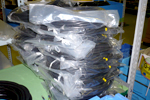
Packing material
(before improvements)
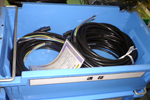
Packing material
(after improvements)
The Advantest Group purchases some of the cable used in products from overseas sources. Due to quality assurance concerns, we used to take delivery of cable packaged in cartons (corrugated boxes) in 300 unit lots. However, ample amounts of cushioning materials in those boxes meant that extra space remained for more items. Accordingly, we realized that if we could ship more cables in each box, we would reduce our consumption of packaging material, while at the same time we would be cutting shipping expenses and using less storage space.
As such, to improve packaging practices we worked with our suppliers in conducting stack testing and drop testing of boxes containing more cables, and made sure that no implications would arise in terms of product durability and quality retention.
In November 2011, after having looked into the matter, we opted to increase the number of cables shipped in a single box, from 300 units to 500. We also reduced usage of cellophane tape (Scotch tape) for securing packing material, from eight taping points to two, thereby reducing the number of boxes used.
Effective use of water resources
The Group's production processes consist mainly of assembly, adjustment, and inspection operations, and do not require as much water as typical manufacturing processes. Most of the company's water consumption is accounted for by air conditioner operations, kitchen and washroom use, and drinking water. In washrooms in our main offices, we continue to use industrial water for flushing toilets. During the summer months, when electricity conservation measures are in effect, we use rooftop sprinklers to discharge water over buildings and grounds, thus lowering temperatures. We continue to urge each employee to conserve water as we pursue efficient use of our water resources.
Water consumption and discharge
